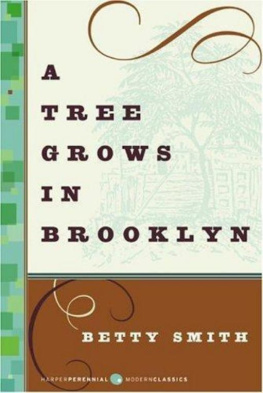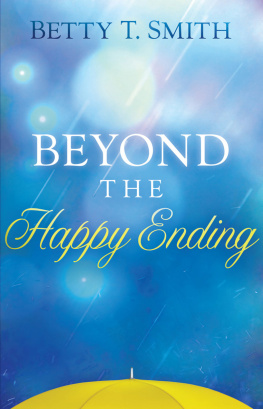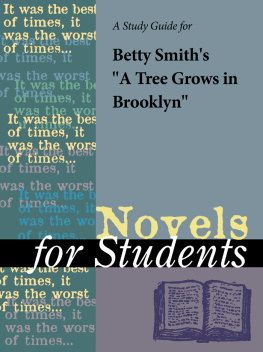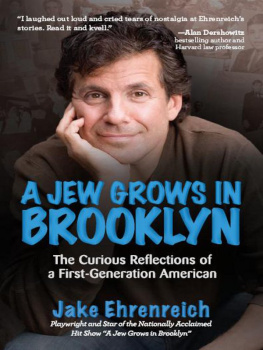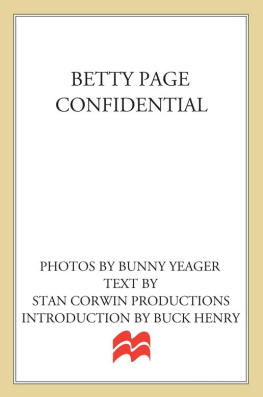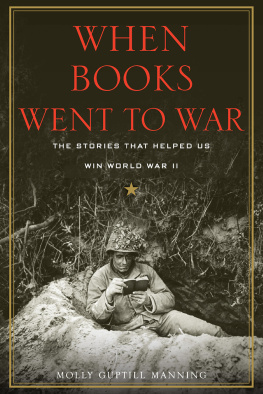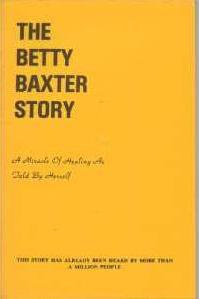Betty Smith - A Tree Grows in Brooklyn
Here you can read online Betty Smith - A Tree Grows in Brooklyn full text of the book (entire story) in english for free. Download pdf and epub, get meaning, cover and reviews about this ebook. year: 2006, publisher: HarperCollins Publishers, genre: Art. Description of the work, (preface) as well as reviews are available. Best literature library LitArk.com created for fans of good reading and offers a wide selection of genres:
Romance novel
Science fiction
Adventure
Detective
Science
History
Home and family
Prose
Art
Politics
Computer
Non-fiction
Religion
Business
Children
Humor
Choose a favorite category and find really read worthwhile books. Enjoy immersion in the world of imagination, feel the emotions of the characters or learn something new for yourself, make an fascinating discovery.
- Book:A Tree Grows in Brooklyn
- Author:
- Publisher:HarperCollins Publishers
- Genre:
- Year:2006
- Rating:5 / 5
- Favourites:Add to favourites
- Your mark:
- 100
- 1
- 2
- 3
- 4
- 5
A Tree Grows in Brooklyn: summary, description and annotation
We offer to read an annotation, description, summary or preface (depends on what the author of the book "A Tree Grows in Brooklyn" wrote himself). If you haven't found the necessary information about the book — write in the comments, we will try to find it.
A Tree Grows in Brooklyn — read online for free the complete book (whole text) full work
Below is the text of the book, divided by pages. System saving the place of the last page read, allows you to conveniently read the book "A Tree Grows in Brooklyn" online for free, without having to search again every time where you left off. Put a bookmark, and you can go to the page where you finished reading at any time.
Font size:
Interval:
Bookmark:
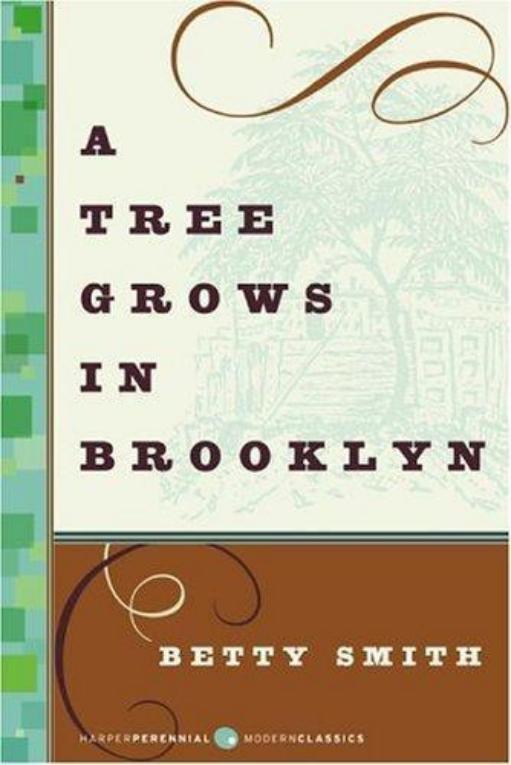
A Tree Grows
in Brooklyn
Betty Smith
There's a tree that grows in Brooklyn . Some people call it the Tree of Heaven. No matter where its seed falls, it makes a tree which struggles to reach the sky. It grows in boarded-up lots and out of neglected rubbish heaps. It grows up out of cellar gratings. It is the only tree that grows out of cement. It grows lushly ... survives without sun, water, and seemingly without earth. It would be considered beautiful except that there are too many of it.
AUTHOR'S NOTE
AN OBSCURE PERSON WHO BECOMES A PUBLIC FIGURE overnight sometimes has minor legends grow up about his unknown years. It has been so with me. It is told that I had an eerie habit of walking through the dark village streets each night at midnight in the company of a big, black, spooky dog. It is said I worked up inspiration that way to write A Tree Grows in Brooklyn .
I did walk through the village each midnight with a black dog. But I was only going to the post office to see if I had a letter in the last mail. The dog, a gentle Labrador retriever, was a friend who nightly waited for me at the corner because he enjoyed a companionable walk to town.
I was lonesome in that time before I had a book published. Like Thomas Wolfe, who as an undergraduate here hung around this same Chapel Hill post office wishing he'd get some mail, I, too, went down to watch them put up the midnight mail hoping someone had written to me. There were seldom any letters-only bills.
I don't take that walk any more because now, any time of the day, Box 405 is filled with letters from people who have read my book. The letters come in from the cities, towns, villages, and rural districts of America . They used to come from foxholes, battleships, hospitals, recreational centers, and from training camps. They still come from the zones of occupation. One came from a notorious gangster's death cell saying that my book was the last he was destined to read in this world. One came from a woman who had just given birth to a child; she wrote she was very poor but her newborn would not lack wealth of tenderness and understanding if she could help it.
Most letters begin: "This is my first fan letter. I've just read your book and I must tell you " They tell me: "I was a girl like Francie Nolan." Or: "My family had the same kind of struggle. My mother was like Katie." Or: "I've never lived in Brooklyn but someone must have told you the story of my life because that's what you wrote." And even: "I'm boiling mad. You wrote my book before I had a chance to get round to it."
I shouldn't, really, answer all the letters. It takes the time I should be putting in on the next book. But I remember how once as a child I read a book which appealed to me deeply and I wrote my heart out in a letter to the famous author. He never answered. I was hurt and ashamed that my heart had been rejected. I vowed then to try to write a better book than he when I grew up and to answer any letters I got about it. So I answer each letter if only to say: "Thanks!" Sometimes it gets to be a chore and I want to give it up but then I worry that I may hurt someone the way this long-ago author did me. So I keep on answering the letters.
My book wasn't dedicated to anyone because I couldn't decide which person was most helpful to me in the writing of it. I thought of the mother who gave me life. I owe a lot to her-and to my sister and brother who made my childhood a magical time. I am grateful to my children whose baby years made a life of pleasant contentment for me. There is something owing to a beloved friend and to an understanding husband; there is a debt to a loved teacher. The grocer who gave me affectionate credit during the lean writing years cannot be forgotten, nor the veterinarian who set my dog's broken leg and brushed aside my promise to "pay sometime," with a gallant, "Oh, forget it!"
I am indebted to chance acquaintances on trains and in bus stations for exchanged confidences about the everlasting verities of life. I am deeply obligated to a person who caused me much anguish because the grief made me grow up emotionally and gave me a little more understanding. I am tenderly grateful to an employer of long ago who on a hot August afternoon told me that the job I was applying for had been filled but who urged me to sit down and rest a minute before I went on to answer the next ad. He brought me a paper cup of iced water. My cup flowed over, literally, when I added a couple of tired tears to the water.
All of these people-hundreds more-in fact, everyone who touched my life for good or bad helped in the writing of my book. I could not dedicate it to one without being disloyal to the others.
But I do want to dedicate this special edition-the edition gotten out solely because so many people were kind about The Tree. I want to dedicate it to you. I want to dedicate it to all of you who've read it and to you who are reading it now. And I want to say: "Thanks! Thanks a whole lot."
BETTY SMITH Chapel Hill , North Carolina June 1947
BOOK ONE
I
SERENE was a word you could put to Brooklyn , New York . Especially in the summer of 1912. Somber, as a word, was better. But it did not apply to Williamsburg , Brooklyn . Prairie was lovely and Shenandoah had a beautiful sound, but you couldn't fit those words into Brooklyn . Serene was the only word for it; especially on a Saturday afternoon in summer.
Late in the afternoon the sun slanted down into the mossy yard belonging to Francie Nolan's house, and warmed the worn wooden fence. Looking at the shafted sun, Francie had that same fine feeling that came when she recalled the poem they recited in school.
This is the forest primeval. The murmuring pines and the hemlocks,
Bearded with moss, and in garments green, indistinct in the twilight,
Stand like Druids of eld.
The one tree in Francie's yard was neither a pine nor a hemlock. It had pointed leaves which grew along green switches which radiated from the bough and made a tree which looked like a lot of opened green umbrellas. Some people called it the Tree of Heaven. No matter where its seed fell, it made a tree which struggled to reach the sky. It grew in boarded-up lots and out of neglected rubbish heaps and it was the only tree that grew out of cement. It grew lushly, but only in the tenements districts.
You took a walk on a Sunday afternoon and came to a nice neighborhood, very refined. You saw a small one of these trees through the iron gate leading to someone's yard and you knew that soon that section of Brooklyn would get to be a tenement district. The tree knew. It came there first. Afterwards, poor foreigners seeped in and the quiet old brownstone houses were hacked up into flats, feather beds were pushed out on the window sills to air and the Tree of Heaven flourished. That was the kind of tree it was. It liked poor people.
That was the kind of tree in Francie's yard. Its umbrellas curled over, around and under her third-floor fire-escape. An eleven-year-old girl sitting on this fire-escape could imagine that she was living in a tree. That's what Francie imagined every Saturday afternoon in summer.
Oh, what a wonderful day was Saturday in Brooklyn . Oh, how wonderful anywhere! People were paid on Saturday and it was a holiday without the rigidness of a Sunday. People had money to go out and buy things. They ate well for once, got drunk, had dates, made love and stayed up until all hours; singing, playing music, fighting and dancing because the morrow was their own free day. They could sleep late-until late mass anyhow.
On Sunday, most people crowded into the eleven o'clock mass. Well, some people, a few, went to early six o'clock mass. They were given credit for this but they deserved none for they were the ones who had stayed out so late that it was morning when they got home. So they went to this early mass, got it over with and went home and slept all day with a free conscience.
Font size:
Interval:
Bookmark:
Similar books «A Tree Grows in Brooklyn»
Look at similar books to A Tree Grows in Brooklyn. We have selected literature similar in name and meaning in the hope of providing readers with more options to find new, interesting, not yet read works.
Discussion, reviews of the book A Tree Grows in Brooklyn and just readers' own opinions. Leave your comments, write what you think about the work, its meaning or the main characters. Specify what exactly you liked and what you didn't like, and why you think so.

